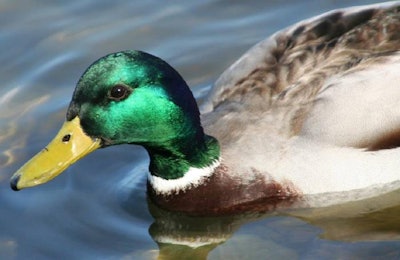
The USDA’s Animal and Plant Health Inspection Service (APHIS) has reported the first detection of avian influenza in the United States in 2017.
APHIS, in a press release issued on January 9, stated that the presence of Eurasian/North American reassortant H5N2 avian influenza in a wild mallard duck in Fergus County, Montana.
No illness or mortalities in domestic poultry in the U.S. have been detected at this time.
The sample, taken from a hunter-harvested bird through routine surveillance, was tested at the Colorado State University Veterinary Diagnostic Laboratory and forwarded to USDA’s National Veterinary Services Laboratories in Ames, Iowa. Characterization of the sample is ongoing.
“This appears to be one of the strains we saw during the outbreak in 2014 and 2015,” said Dr. Jack Shere, USDA Chief Veterinarian. “This finding serves as a powerful reminder that there is still avian influenza circulating in wild birds, and producers and industry need to continue to be vigilant about biosecurity to protect domestic poultry.”
Precautions and education
Wild migratory waterfowl are a natural reservoir for avian influenza, and these viruses can travel in wild birds without them appearing sick. People should avoid contact with sick/dead poultry or wildlife. If contact occurs, wash your hands with soap and water and change clothing before having any contact with healthy domestic poultry and birds.
Anyone involved with poultry production from the small backyard to the large commercial producer should review their biosecurity activities to assure the health of their birds. To facilitate such a review, a biosecurity self-assessment can be found on the USPOULTRY website.
USDA recently launched Defend the Flock, a new educational campaign that provides commercial poultry owners and growers, as well as the poultry industry and federal/state/local animal health officials, resources to help ensure that the best biosecurity practices are used to protect commercial flocks from infectious disease.
Hunters should dress game birds in the field whenever possible and practice good biosecurity to prevent any potential disease spread. APHIS offers biosecurity information online.
In addition to practicing good biosecurity, all bird owners should prevent contact between their birds and wild birds and report sick birds or unusual bird deaths to State/Federal officials, either through their state veterinarian or through USDA’s toll-free number at +1.866.536.7593.
















